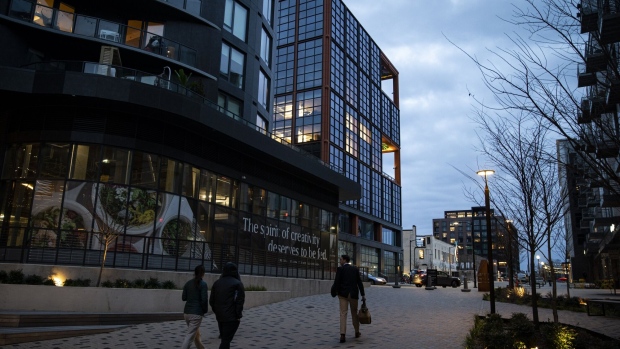Apr 9, 2024
Washington DC’s Cash Bounty to Wither on Empty Offices, Downtown
, Bloomberg News

(Bloomberg) -- After a decade of flush coffers, Washington is bracing for lower revenue as the downtown of the nation’s capital continues to struggle with a post-pandemic bounceback.
Glen Lee, Washington’s chief financial officer, cautioned that the extra cash the city has enjoyed for the last several years is at risk as a result of slower revenue growth, the end of pandemic stimulus funding and higher operating costs.
“The surpluses that we’ve been enjoying are going to shrivel up,” Lee said in an interview. As of the end of 2023, Washington had about $1.5 billion in reserve funds. “Worrying about whether or not we have enough cash on hand to pay bills — which was something inconceivable for a CFO since 2010 — is now a real issue.”
Washington’s financial woes are echoed in cities across the country, as many downtowns are in flux with commuters continuing to work hybrid schedules, leading companies to downsize on office space. The number of workers who went into the office in 10 of the largest US business districts fell to 48% of pre-Covid-19 levels in the week ended April 3, according to data from Kastle Systems. The Washington-Arlington-Alexandria region is at about 44.3%.
“There is a reality that not having 200,000 to 250,000 people in the jurisdiction every day means a lot less lunches and other things,” Lee said. “That’s real money and it has a dampening effect on our sales tax.”
The White House is demanding the heads of federal departments and agencies begin personally tracking efforts to get government workers to return to the office, warning that many managers are falling short of President Joe Biden’s goals for increasing in-person work.
Mayor Muriel Bowser unveiled a $21 billion budget plan Wednesday that attempts to raise much needed cash. Her plan includes boosting the city’s sales tax and instituting other revenue-generating measures. The district made progress on reducing a budget gap by eliminating positions, cutting programs and maximizing federal reimbursements, according to the mayor’s office.
To close the remainder of the shortfall, which stands at roughly $300 million, the budget plan recommends raising new revenue in part by adding a fee on hotel room stays, a release detailed.
Read More: DC Budget Proposes Sales Tax Hike, Office Conversion Tax Break
Money from the city’s sales levy makes up about 13% of the general fund revenue, with property taxes accounting for more than a quarter, according to the 2024 approved budget. And with residents embracing a hybrid work environment, the city’s real estate is taking a hit — which lowers the property valuations and decreases related tax revenues. An office building near the White House recently sold at a 75% discount.
“If you’re like us depend heavily on property tax, and our property tax depends entirely on assessed value,” Lee said. “It hurts us maybe relatively more than other jurisdictions.”
The work-from-home environment has also caused problems for the Washington Metropolitan Area Transit Authority, the public transit agency that supports the region, weekday ridership is hovering around 78%, contributing to a projected $750 million budget shortfall in fiscal 2025. Bowser’s budget proposes $217 million to help shore up the agency’s finances.
“The fundamental demand for the system has shifted because of remote work,” Lee said. He suggested that the system should be reevaluated given the needs the city has today, which has shifted from five years ago. “Today is different.”
©2024 Bloomberg L.P.






